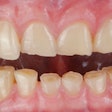Poor diet and nutrition may play a role in the development of temporomandibular disorders (TMDs), according to a study recently published in BMC Oral Health.
Affected patients often eat less nutritious foods, and they tend to consume more proinflammatory foods like ultraprocessed foods, trans fats, and refined sugars, the authors wrote.
“This study highlights dietary quality as a key component of the mechanisms underlying painful TMD,” wrote the authors, led by Camila Cury Marques of the Egas Moniz School of Health and Science in Portugal (BMC Oral Health, September 17, 2025, Vol. 25, 1410).
The cross-sectional study included 92 dental patients ages 20 to 50 with or without a TMD diagnosis. Participants completed a single visit during which they were screened using the TMD Pain Screener from the Diagnostic Criteria for TMD (DC/TMD), the study’s authors wrote.
Those with at least one positive response received the full DC/TMD evaluation, while participants with all negative answers were placed in the control group. Pain was measured using the Characteristic Pain Intensity measure from the Graded Chronic Pain Scale and pressure pain threshold testing using a digital algometer.
Dietary habits were assessed via a 24-hour food recall survey and analyzed using the Healthy Eating Index (HEI) and Dietary Inflammatory Index (DII) to score adherence to dietary guidelines, intake of major food groups, and the diet’s inflammatory potential. Additionally, the Mediterranean Diet Adherence Screener (MEDAS) assessed how often participants consumed key Mediterranean foods such as olive oil, lean meats, and whole grains, they wrote.
The TMD group showed significantly lower HEI scores (p = 0.001) compared to the control group. They also consumed less vitamin C (p = 0.027) and vitamin B12 (p = 0.003) but had a higher carbohydrate intake (p = 0.007). No significant differences were found between groups for the DII or MEDAS scores (p > 0.05). However, a lower HEI score was a strong predictor of TMDs compared with controls.
Nevertheless, the study had limitations. Dietary intake was measured with a single 24-hour recall, which may have introduced recall bias and overlooked seasonal eating patterns, the authors added.
“Further longitudinal and intervention studies are necessary to clarify causal relationships and optimize dietary recommendations as part of comprehensive TMD management strategies,” they concluded.




















